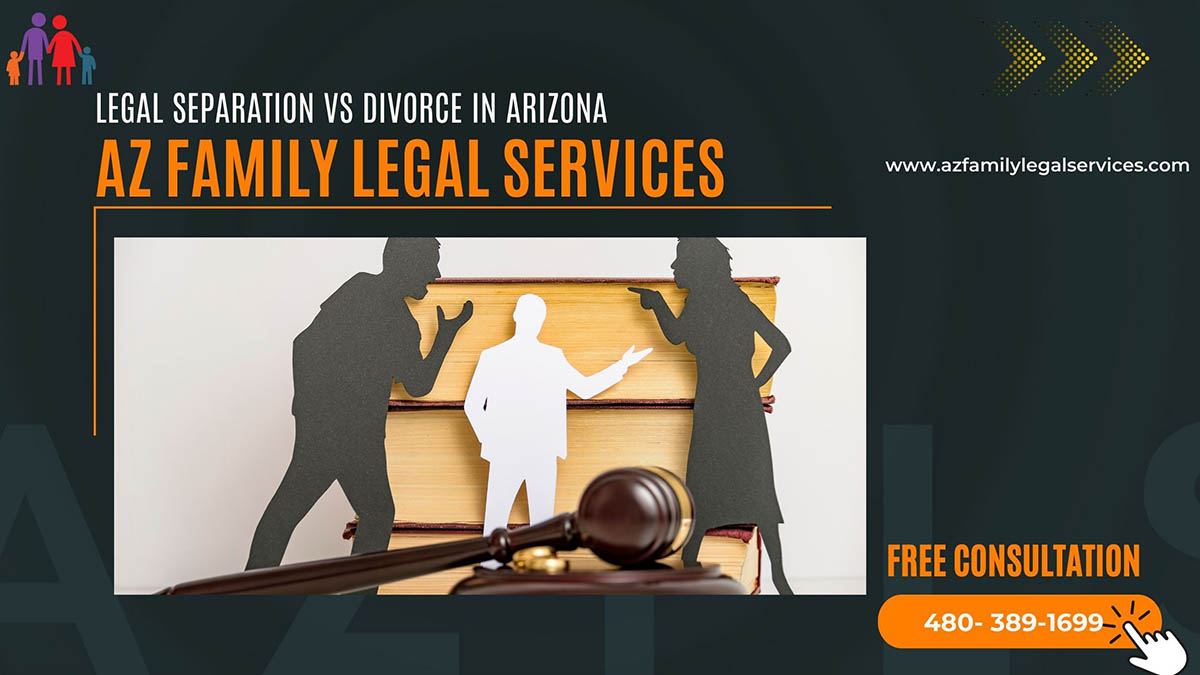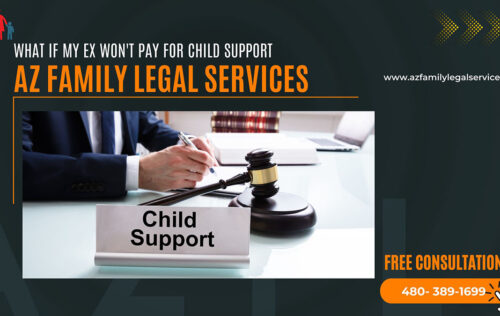Legal Separation Vs Divorce in Arizona

Navigating the legal choices of Separating from your Spouse in Arizona can be a daunting task. The decision between Legal Separation and Divorce carries significant implications for individuals and families. It’s crucial to grasp the differences between the two options to make informed decisions about your future. This guide will help you understand the distinctions between Legal Separation and Divorce in Arizona, empowering you to navigate the process confidently.
At AZ Family Legal Services, we understand that navigating the complexities of Family Law can be overwhelming, especially when it comes to deciding between legal separation and divorce in Arizona. Feel free to reach out to us at (480) 389-1699 for guidance and support as you navigate through this challenging time.
Legal Separation in Arizona: What You Need to Know
Legal Separation in Arizona is a legal process that allows Married Couples to live apart while remaining legally married. Unlike Divorce, which terminates the Marital Relationship, Legal Separation provides an alternative for couples who may wish to separate temporarily or for other personal or financial reasons. Here’s a detailed look at what you need to know about Legal Separation in Arizona:
Understanding the Legal Basis
In Arizona, Legal Separation is governed by State Laws and Court Procedures outlined in the Arizona Revised Statutes. Couples seeking Legal Separation must file a petition with the court, similar to the process for Filing for Divorce. The petition outlines the grounds for Legal Separation, which can include irreconcilable differences or other reasons recognized by the court.
Marital Status and Rights
One of the key distinctions between Legal Separation and Divorce in Arizona is that Legal Separation does not dissolve the Marriage. Despite Living Separately, the Couple remains Legally Married and cannot remarry. However, Legal Separation does allow couples to address important issues such as Property Division, Child Custody, Visitation, and Support through a legally binding Separation Agreement.
Division of Assets and Debts
Just like in Divorce Proceedings, couples undergoing Legal Separation in Arizona can negotiate the division of marital assets and debts. Arizona follows a Community Property System, which means that Assets and Debts acquired during the marriage are typically considered community property and subject to equal division unless the couple agrees otherwise or the court orders otherwise.
Child Custody and Support
Legal separation proceedings also allow couples to address matters related to Child Custody, Visitation, and Support. Parents can negotiate and establish custody arrangements that are in the best interests of the child, taking into account factors such as parental involvement, the child’s relationship with each parent, and the child’s well-being. Child Support may also be determined based on the Arizona Child Support Guidelines.
Healthcare Benefits and Other Considerations
Legal Process and Requirements
The legal process for obtaining a Legal Separation in Arizona involves filing a petition with the appropriate court, serving the petition to the other spouse, and attending court hearings to resolve any contested issues. Like divorce proceedings, legal separation requires full disclosure of assets, liabilities, and income, as well as cooperation between both parties to reach a mutually agreeable separation agreement.
Legal separation offers couples an alternative to divorce, providing space and time to evaluate the relationship without permanently ending the marriage. It can be a viable option for those who have religious or personal objections to divorce or wish to maintain financial or social benefits associated with marriage.
Divorce in Arizona: What You Should Consider
Divorce, on the other hand, is the legal termination of a marriage, resulting in the dissolution of marital ties. In Arizona, divorce proceedings involve several key steps:
Legal Proceedings and Filing for Divorce
Initiating a Divorce in Arizona involves filing a petition for dissolution of marriage with the appropriate court. This legal document outlines the Grounds for Divorce, which in Arizona can be based on irreconcilable differences, without the need to prove fault. Filing for divorce marks the beginning of a legal process that will address various aspects of marital dissolution.
Division of Marital Assets and Debts
Child Custody and Support Arrangements
For couples with children, divorce necessitates decisions regarding Child Custody, Visitation Schedules, and Child Support. The primary focus in determining Child Custody arrangements is the best interests of the child, considering factors such as parental involvement, the Child’s relationship with each parent, and the child’s well-being. Child support calculations in Arizona adhere to the state’s Child Support Guidelines, which consider factors such as each parent’s income, childcare expenses, and healthcare costs.
Spousal Support Considerations
Spousal Support, also known as Alimony, may be awarded in Arizona divorce cases to provide financial assistance to a spouse who requires support or to help maintain the standard of living established during the marriage. Factors influencing Spousal Support determinations include the duration of the Marriage, each spouse’s earning capacity, contributions to the marriage, and any disparities in income or financial resources.
Residency Requirements and Legal Proceedings
Factors to Consider When Choosing Between Legal Separation and Divorce
When faced with the decision between Legal Separation and Divorce in Arizona, several factors warrant careful consideration. Each option carries unique implications for individuals and families, and understanding these factors can help individuals make informed decisions about their future. Here’s a detailed exploration of the key considerations:
Emotional Impact and Long-Term Goals
Financial Implications and Property Division
Child Custody and Support Arrangements
Healthcare Benefits and Social Considerations
Religious or Personal Beliefs
Seeking Legal Guidance in Arizona
If you are facing the decision between legal separation and divorce in Arizona, AZ Family Legal Services is here to help. Our team of experienced family law attorneys understands the complexities of Arizona’s legal system and can provide the guidance and support you need during this challenging time.
With a commitment to serving the Phoenix community, we offer compassionate and personalized legal representation tailored to your unique needs and circumstances. Whether you are considering legal separation, divorce, or need assistance with child custody or support matters, we are here to advocate for your rights and protect your interests.
Contact AZ Family Legal Services today at (480) 389-1699 to schedule a consultation and take the first step toward resolving your family law issues. Let us help you navigate the complexities of legal separation and divorce in Arizona with confidence and peace of mind.
Frequently Asked Questions About Legal Separation and Divorce in Arizona
Q: What is the difference between legal separation and divorce in Arizona?
A: Legal separation allows couples to live separately while remaining married, whereas divorce terminates the marital relationship.
Q: Can I remarry if I am legally separated in Arizona?
A: No, legal separation does not allow either party to remarry, as the marriage remains legally intact.
Q: How long does it take to get a legal separation or divorce in Arizona?
A: The timeline for legal separation or divorce proceedings in Arizona varies depending on factors such as the complexity of the case and court scheduling. It typically takes several months to finalize either process.
Q: Do I need to have grounds for divorce in Arizona?
A: Arizona is a “no-fault” divorce state, meaning you do not need to prove fault or specific grounds for divorce. Irreconcilable differences are sufficient grounds for divorce.
Q: How is property divided in a legal separation or divorce in Arizona?
A: Arizona follows a community property system, where marital assets and debts are typically divided equally between spouses unless they agree on an alternative arrangement.
Q: Can I get spousal support (alimony) in Arizona?
A: Spousal support may be awarded in Arizona if one spouse requires financial support or to maintain the standard of living established during the marriage.
Q: How are child custody and support determined in Arizona divorce cases?
A: Child custody and support decisions are made based on the best interests of the child, taking into account factors such as parental fitness, the child’s relationship with each parent, and the child’s preferences (if old enough to express them).
Q: Can I modify child custody or support orders in Arizona?
A: Child custody and support orders may be modified in Arizona if there has been a substantial change in circumstances warranting a modification, such as a change in the child’s needs or a parent’s financial situation.
Q: What are the residency requirements for filing for divorce in Arizona?
A: At least one spouse must have been a resident of Arizona for at least 90 days before filing for divorce in the state.
Q: Do I need an attorney for legal separation or divorce in Arizona?
A: While it is possible to represent yourself in legal separation or divorce proceedings, it is highly recommended to seek the guidance of an experienced family law attorney to ensure your rights are protected and your interests are represented effectively. AZ Family Legal Services can provide the expertise and support you need during this challenging time.



